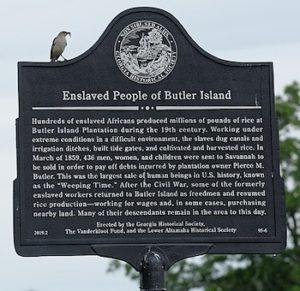
*The Butler Island Plantation was affirmed on this date in 1790. This estate is a former rice plantation on Butler Island on the Altamaha River delta just South of Darien, Georgia.
Major Pierce Butler, a founding father of the United States and a supporter of slavery, owned the property in 1790. He ran the plantation until he died in 1822, when his unmarried daughter Frances became a trustee, with the overseer, Roswell King, as her co-administrator. Upon the death of trustee Frances in 1836, controlling ownership shifted to Major Butler's two chosen heirs, grandsons of Butler's oldest daughter, who had made their permanent homes in Philadelphia.
The plantation was abandoned when the American Civil War began. In 1866, Butler's daughter Frances returned with her father to attempt to restore the plantation to its former glory. Unlike her younger sister Sarah, who was aligned with her mother, Frances adopted her father's pro-slavery views and kept a diary like her mother. She published it in 1883, titled Ten Years on a Georgia Plantation. It is considered the best account of what it was like for whites who were former plantation owners in Georgia during Reconstruction. In Frances' view, blacks fared better under slavery than under freedom.
Due to the lack of slave labor, plantations failed, and the fifth generation of Butlers sold the remains of their lands in 1923. Tillinghast L'Hommedieu Huston purchased the plantation in 1926. He converted it into a dairy and lettuce farm and built the Huston House on the property in 1927. After his death, the plantation was sold to R. J. Reynolds Jr. Today, the Georgia Department of Natural Resources manages the plantation. The area is open every day to the public for recreational activities.